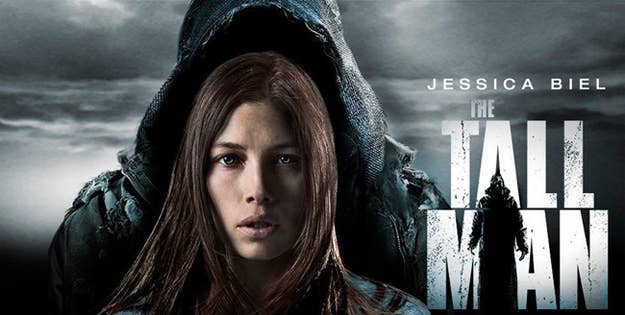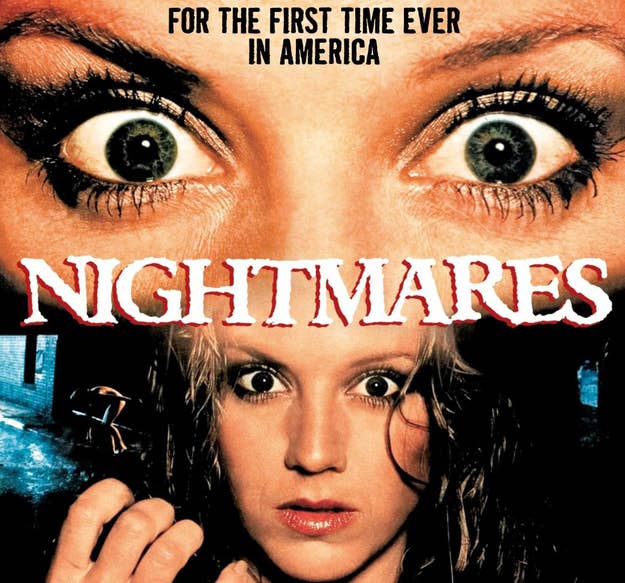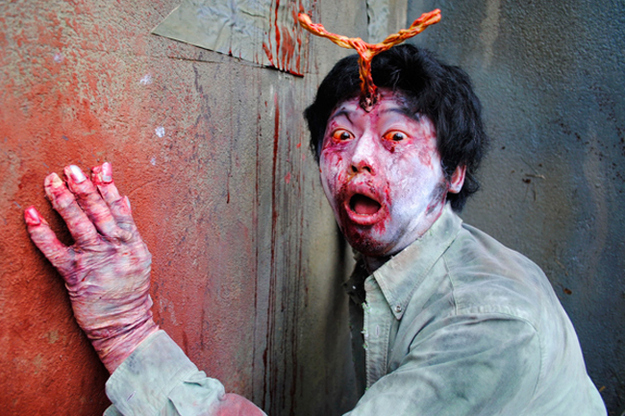
If you're in the mood for a shifty, slow-burning thriller with a couple tricks up its sleeve: The Tall Man (2012, Pascal Laugier)
The title character in Pascal Laugier's The Tall Man is a figure of legend, spun out of fear and grief by the residents of a dying mining community to explain the mysterious disappearances of several children in the area. Jessica Biel, doing well by a difficult role that hopefully points towards a more interesting future for her, is Julia Denning, the town’s doctor, a mantle she inherited from her husband. One night, the Tall Man comes for her son David, and she frantically gives pursuit. From there, Laugier keeps the ground moving violently under us. While his tricky script is the film’s chief asset, his direction is impressive in ways that may not be immediately apparent — he constructs a good sense of a dead town consuming itself in the wake of economic catastrophe and perpetuating cycles of abuse and neglect. While it should be apparent that the film has far more on its mind than a simple supernatural conundrum, the knotty moral issues it ultimately brings up leave far more to chew on than expected, and prove disturbing in ways that aren’t generally provided by the average horror movie. And even when it looks like all the answers have been proffered, the plaintive question that closes the film is left to hang as an ambiguous echo. In its own unassuming way, The Tall Man means to leave a bruise. And it does.

If you're in the mood for an over-the-top splatterfest, Aussie style: Nightmares (1980, John D. Lamond)
Is it possible for a suspense thriller to succeed if there’s no suspense in it? In the case of the Australian backstage horror film Nightmares, the answer is: “Sure. Why not?” While structurally similar to any number of murder mysteries and containing a goodly number of killer-POV shots assumedly meant to obscure the identity of said killer, there’s never any doubt who's butchering the cast of a local stage production: twitchy, sex-phobic lead actress Helen Selleck (Jenny Neumann), who's trying to make a go of getting by in normal society, but is stymied by her broken-glass-induced psychosis at every opportunity. (You’d be nuts too if you inadvertently caused your mother’s gruesome death in a car accident by trying to stop her from being groped by a male paramour and then had a doctor straight-up tell you it was entirely your fault.) So, what to do with a film that moves like a mystery but lacks the mystery component?
There’s a giveaway line from the production’s pompous director (Max Phipps) when berating a headstrong actresses’ need for justification for her dialogue: “The literal meaning of the words in this piece is unimportant! The beauty and drama is contained in the rhythm!” From the start, director John D. Lamond goes full-throttle on lunatic energy. He draws heavily from the giallo genre — there’s a pounding score, a black-gloved killer and a savagely striking compositional sense, best demonstrated by a terrific early nightmare sequence featuring roaming Steadicam photography, frantic edits timed to the sound of smashing glass and a bombastic orchestral score. Graphic sex piles up next to graphic violence, often within the same scene (more than one stalk-and-slash sequence features a nude female). Whether it’s a genuine artistic statement related to Helen’s twisted view of desire as essentially poisonous, or just Lamond’s gleeful indulgence of inflamed perversity (horror is, among other things, about base reactions and exciting the senses), it doesn't really matter. The potency is the same. As a suspense flick, Nightmares ain’t much, but as lurid stab-happy exploitation, it’s aces.

If you're in the mood for an over-the-top splatterfest, Japanese style: Helldriver (2010, Yoshihiro Nishimura)
Yoshihiro Nishimura’s high-energy gore-and-swords extravaganza Helldriver is series of films in which the criticism I have to offer is beyond the point: A description of certain scenes in the film is all that’s needed to convince any prospective viewer to take a chance on it. Helldriver, in its first thirty minutes, has a lengthy scene in which the robotically enhanced heroine, armed with a hybrid chainsaw-katana, fights an army of chainsaw-wielding alien zombies. She manages to sever all of their arms, at which point the arms — still holding the chainsaws — continue to advance on her. And well, if you made it through that description and are currently pumping your fist, you’re probably in the target audience for Nishimura’s cracked concoction.
It takes talent to breathe genuine life into this kind of flick. This is the third film I’ve seen from Nishimura (after Tokyo Gore Police and Vampire Girl vs. Frankenstein Girl), and he’s got that talent. There’s something very appealing about the particular blend that goes into his inventively gory madness — a showman’s desire to entertain at all costs, a hyper-caffeinated sense of propulsive pacing, a special effects man’s taste for bizarre and unique iterations of contorted mix-and-match body horror. Also, just the slightest pinch of melancholic alienation. The last element is what makes Nishimura's films stick in a way that the likes of, say, The Machine Girl doesn’t. And while it’s not as pronounced in Helldriver as his other films, there’s just enough of that alienation in the cynical self-interested depiction of Japanese politics, toxic family relations and general human nature to add the right amount of ballast. When a person on a news report, in relation to a killing spree unrelated to the zombie crisis, proclaims “We’re all strangers, after all” — well, the import of that line in a film with zombies is hard to miss. But beyond that, where else are you going to see a bombardier squad of flying zombie heads, the heroine stripper-pole dancing around a zombie’s exposed spinal column, and Eihi Shiina trading in her usual menacing demureness for crazed scenery-devouring extravagance as the film’s main villain?
The Netflix streaming library is vast and daunting and mostly filled with crap. Steve Carlson is the Netflix video clerk, and every week he hand-delivers three awesome movies you've never heard of before. He's been writing about movies in one form or another on the Internet since 2002 and co-hosts the Bad Idea Podcast. Someone once called him the lonely Magellan of exploitation cinema. He thinks that's the best compliment he's ever received.
